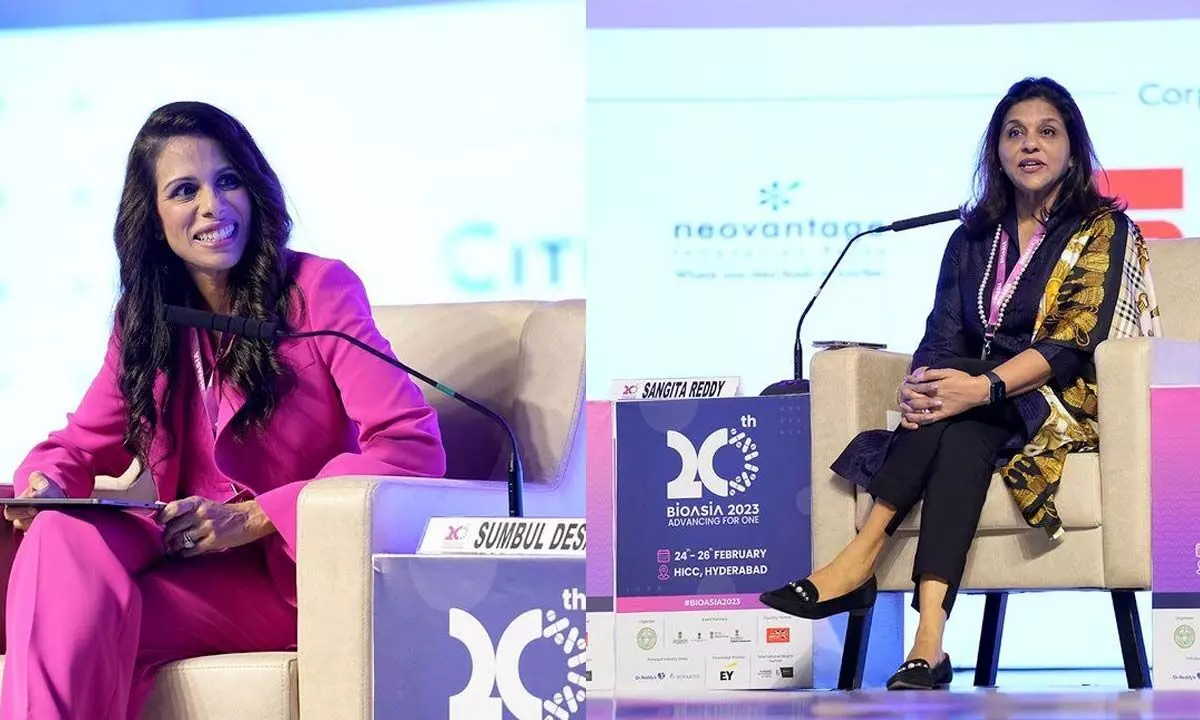‘Apple puts customer in control of their data’
The tech company claims that user data is saved on the local device of the customer and not on the cloud
image for illustrative purpose

Hyderabad: “We are innovating on proactive preventative health where you are notified even before you may have symptoms. Also, we have really thought about where we can make an impact in proactive preventative health starting with the heart features,” said Dr Sumbul Desai, Vice President of Health at Apple, USA
Indian-origin Dr Desai participated in a fireside chat with Sangita Reddy, Joint Managing Director of Apollo Hospitals at the 20th edition of BioAsia 2023 in Hyderabad. Hosted by the Telangana government, BioAsia is an annual international event focused on life sciences, biotechnology, pharma, medtech and healthtech sectors. The event was held in the city from February 24–26.
Apple, one of the manufacturers of wearable devices, is utilising technology to promote proactive preventative health, as data privacy is a matter of concern for the multinational technology company. “We are also focused on mobility in women’s health,” Dr Desai said.
Technology is at the core of healthcare for both Apollo Hospitals and Apple, as Reddy stated, “Leveraging all the technologies possible, whether its AI to personalise the healthcare experience or if we can understand risk better and apply that at national or global level. We are looking at prevention and early detection.”
The usage of technology in healthcare creates a bank of data which in turn puts the privacy of the user in question. On this issue, Apple clarified that the company does not have any access to their user’s data. “One of the biggest misconceptions is ‘oh you must have access to all of our data and learning on it’. Actually, we do not have access to that data. Your data is on your local device, we do not see data on the cloud, we do not do learning on the cloud. When we create features as heartbeat notifications, walking steadiness, we ensure that the user is in control of their data and Apple does not have access to that data,” Dr Desai said.
Speaking about Apple’s women health study, she said, “Now when you are wearing the watch, we have access to biometrics. So how does it inform women about their health? We are refreshing the data and understanding the science of women’s health. Through the data, we are finding that a lot of women experience PCOS which is often under-diagnosed. We also found that women with PCOS, a percentage of them also have a regular heart rate notification. We are excited to do it in a way that is validated with the medical community.”
Reverting on validation of data, Sangita Reddy said, “it is very important for us to stay with evidence based, and to translate terra bytes of data into actionable insights and share them effectively. Federated learning models are important to us and this is all directed towards touching the consumers and doctors. All of us have a very important role to play. Fast translation of data is the key.”
In US and Canada, Apple has the provision of clinical health record which the user can access from their iPhone, in an aggregated manner. “We want the user to securely and privately access their health record information – they are empowered to have that information to have better clinical interaction. We are all about taking opportunities to empower users through the watch. The areas where we are focused on are the areas where there is validation,” Dr Desai said.
Apple has a feature called walking steadiness integrated in its wearable device. “Over two lakh samples of consenting participants’ data were looked into to study changes in mobility patterns to classify movements. Essentially, we are focused on evidence-based ways to clinically validate. The way I would think about it is to view our work very early – there is a lot more science to discover,” she said.
The discussion between Reddy and Dr Desai revolved around two important talk points, the integration of technology and preventive healthcare. While Dr Desai spoke about Apple data and the watch creating a personalized health record, Reddy explained about Apollo research and innovation conducting 150 clinical trials or more in contribution to the area of preventive healthcare. “Science has proved time and again, that that the body is giving early warning symptoms to correct them. I used to say that biology, bytes and bandwidth are the 3 BS transforming healthcare.”

